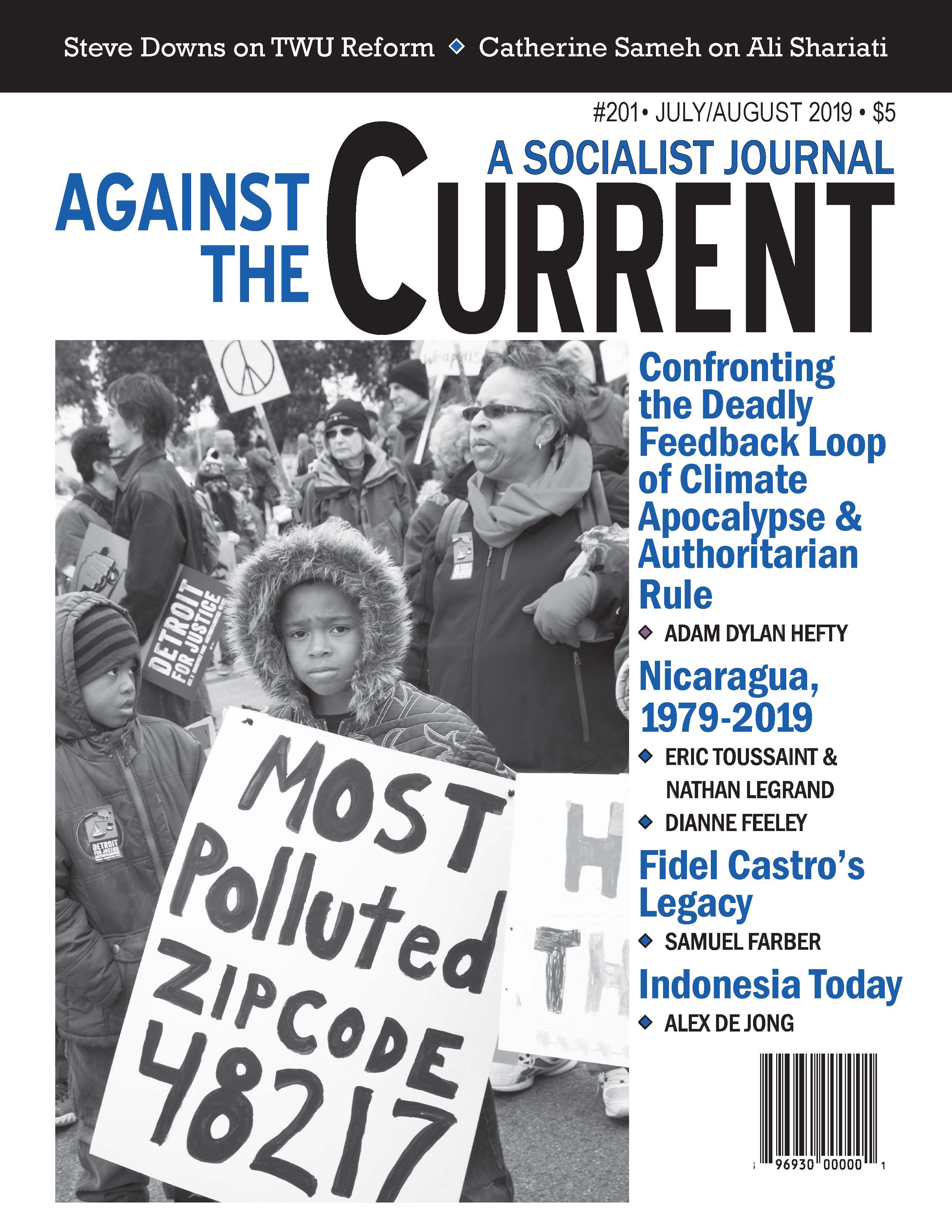Against the Current, No. 201, July/August 2019
-
How Many More Wars?
— The Editors -
A Note on ATC 201
— The Editors -
The Politics of Climate Looting
— Adam Dylan Hefty -
Reform in TWU 100--Thirty Years On
— Steve Downs -
Indonesia's Election and Polarization
— Alex de Jong -
Nicaragua 1979-2019
— Eric Toussaint and Nathan Legrand -
Sandinismo Is in the Streets
— Dianne Feeley -
Fidel Castro's Rule and Legacy--Part II
— Samuel Farber - Review Essay
-
A Historian's View of Post-Fascism
— Alan Wald -
A Puzzle: George and Hilde Mosse
— Alan Wald - Reviews
-
The Truth About the VA
— Ronald Citkowski -
Towards a Decolonial Global Solidarity
— Catherine Sameh -
On Marx and Ecosocialism
— Michael Löwy -
That Oldtime Queer Utopia
— Peter Drucker - In Memoriam
-
Daniel Clawson ¡Presente!
— Karin Baker
How Many More Wars?
— The Editors
SOMEWHERE IN THE depths of his prodigious ignorance, it evidently dawned on Donald Trump that his national security advisor and the Secretary of State are pushing the United States toward war with Iran. That’s exactly the kind of ruinous conflict that Trump said he’d avoid when he became President — but on an even larger scale than his predecessors’ disastrous adventures in Iraq and Afghanistan.
Confusion rules. One day’s headlines indicate that war somewhere is imminent, the next day’s that tensions are easing, depending on the reading of the latest tweets. With the chaotic swirl of messages coming from this administration — on Iran, on North Korea, on Venezuela, on trade with China, Japan and Europe, and so much more — the actual odds of threats turning into reality are frankly imponderable. Certainly, the U.S. population does not want war anywhere. But what are the forces that can resist and block a road to catastrophe?...
A Note on ATC 201
— The Editors
JULY, 2019 MARKS a bittersweet 40th anniversary of the Sandinista Revolution in Nicaragua, the overthrow of the U.S.-backed Somoza dictatorship. This year is also the 60th anniversary of the Cuban revolution led by Fidel Castro’s guerilla forces. In this issue of Against the Current we present retrospectives on the fate of the Nicaraguan revolution by Eric Toussaint and Dianne Feeley, and on the legacy of Fidel Castro’s rule in Cuba by Samuel Farber. We also present Catherine Sameh’s review of an important book on the thought and legacy of Iranian activist and intellectual Ali Shariati, whose rediscovery is part of the fervent struggle against both imperial-colonial domination and the brutal social and political repression in the “Islamic Republic.”
July-August 2019, ATC 201
The Politics of Climate Looting
— Adam Dylan Hefty

ON OCTOBER 8, 2018 twin disasters were announced on opposite sides of the world:
• In Brazil, as votes were counted from the first round of presidential elections, Jair Bolsonaro won 46% of the vote — enough to make it clear he would probably cruise to a second-round victory three weeks later.
• In Incheon, South Korea, the Intergovernmental Panel on Climate Change (IPCC) revealed the findings of its special report: limiting global warming to 1.5° C “would require rapid, far-reaching and unprecedented changes in all aspects of society” within the current generation.(1)...
Reform in TWU 100--Thirty Years On
— Steve Downs
TRANSPORT WORKERS UNION of America’s (TWU) Local 100, representing most of New York City ’s subway and bus workers, has a proud history as a militant union that has won solid gains in wages and benefits for its members. Credit for this is often given to Michael Quill, the union’s central leader from its founding in 1934 until his death in 1966.
Quill deserves a lot of credit, but he didn’t act alone. Obviously, the members who supported Quill, his leadership team, and their successors were critical to shaping the union’s history. Just as critical were some of the members and officers who challenged Quill and the officers who came after him. There was rarely a decade since its founding in 1934 that Local 100’s leadership did not face an organized electoral and/or political opposition.(1)...
Indonesia's Election and Polarization
— Alex de Jong
THE INDONESIAN ELECTIONS of April 2019 were a competition between a disappointment and a thug. Incumbent president Joko “Jokowi” Widodo defeated former army officer Prabowo Subianto, but there remains little of the enthusiasm of his 2014 victory. But compared to Prabowo, a political criminal campaigning on a combination of authoritarian leadership, chauvinism and political Islam, Jokowi appeared to many as the preferable option.
Even before the official results came in, it was clear that Jokowi had defeated Prabowo, and that Prabowo would not accept this. As he did five years ago, Prabowo blamed his defeat on fraud, but this time he chose to escalate the situation....
Nicaragua 1979-2019
— Eric Toussaint and Nathan Legrand
THE NICARAGUAN GOVERNMENT’S violent repression against demonstrators protesting its brutal neoliberal policies, resulting in more than 300 people being killed by regime forces since April 2018, is only one of the reasons why various leftist social movements have condemned the Nicaraguan regime led by President Daniel Ortega and Vice-President Rosario Murillo.
The Left has many more reasons to denounce the policies of the regime. To understand this, we must go back to 1979. That year saw the victory of an authentic revolution in Nicaragua that combined a popular uprising, self-organization of cities and neighborhoods in rebellion, and the action of the Sandinista National Liberation Front (Frente Sandinista de Liberación Nacional — FSLN), a political-military organization inspired by a Marxist-Guevarist/Castroist model.
Sandinismo Is in the Streets
— Dianne Feeley
MORE THAN 100,000 U.S. citizens went to Nicaragua between the 1979 overthrow of the Somoza regime and the electoral defeat of the Sandinistas (FSLN) in 1990. I was among them, planting trees in Managua while my own government armed the Contra war. Others went on health brigades, bringing needed medicines to hospitals and clinics, or volunteered on farms.
Wherever we went, we met Nicaraguans who were transforming their lives. I was there for a month in the fall of 1984, during the first election campaign. As the right wing boycotted the election, I attended various debates among leftist candidates. It was an exciting moment.
Fidel Castro's Rule and Legacy--Part II
— Samuel Farber
THE FACT THAT the new Cuban revolutionary government was undemocratic did not mean that it was not popular, particularly during its first 30 years. Fidel’s regime enjoyed a great deal of popular support until the early nineties, when the collapse of the Soviet bloc produced a severe economic crisis in the island that alienated a substantial part of the population, especially the youth.
This support was based on four principal factors: First, the regime was perceived by most Cubans as being honest, an important departure from the popular view of practically all previous Cuban governments. The top revolutionary leadership surely enjoyed a much higher standard of living than the majority of the population, but based on their privileged access to all kinds of consumer goods (including travel abroad as part of official delegations) and not on their theft of public monies or in any kind of racketeering (drugs or gambling) inside Cuba.(1)...
Review Essay
A Historian's View of Post-Fascism
— Alan Wald
The New Faces of Fascism:
Populism and the Far Right
By Enzo Traverso
London: Verso, 2019, 200 pages, $24.95, hardback.
THE TITLE OF a recent exchange of opinions in the New York Review of Books, “How to Write About the Right,” accentuates the imperative to theorize the global phenomenon of the rise of a new populist, xenophobic, and racist Right that Enzo Traverso tackles in his new short volume from Verso. Yet the interchange bizarrely climaxes with liberal iconoclast Mark Lilla channeling the voice of a wise wizard (possibly J. R. R. Tolkien’s Gandalf):
“Whatever we are facing [in world politics], it is not twentieth-century fascism. Hell keeps on disgorging new demons to beset us. And as seasoned exorcists know, each must be called by its proper name before it can be cast out.”(1)...
A Puzzle: George and Hilde Mosse
— Alan Wald
HILDE L. MOSSE fled Germany along with her brother, completed her medical degree in Switzerland, and came to the United States around the same time as George, doing a residency in Schenectady. In 1946 she became a founder of the Lafargue Mental Health Clinic in Harlem, named for French Marxist Paul Lafargue, Karl Marx’s son-in-law (of mixed ancestry, including African, Native American, and Jewish).
The famous clinic, which lasted about 10 years and also played a role in early civil rights legislation, focused on the needs of Black patients and was financially and otherwise backed by former Communist writers Richard Wright and Ralph Ellison...
Reviews
The Truth About the VA
— Ronald Citkowski
How the VA Delivers Health, Healing and Hope to the Nation’s Veterans
By Suzanne Gordon
Cornell University Press 2018, 464 pages, $29.95 hardcover.
SUZANNE GORDON IS an author, journalist, speaker and patient advocate with a long and distinguished career in the field of health care systems. In 2014, a number of highly publicized media attacks on the U.S. Department of Veterans Affairs Health Administration system (VHA), characterizing it as inept, corrupt and incapable of delivering adequate health care to veterans, caught her attention....
Towards a Decolonial Global Solidarity
— Catherine Sameh
Beyond Shariati:
Modernity, Cosmopolitanism, and Islam in Iranian Political Thought
By Siavash Saffari
Cambridge: Cambridge University Press, 2017, 213 pages, $32.99 paper.
IN THE WAKE of the 40th anniversary of the 1979 Iranian revolution, it is worth reflecting not so much on what has changed or stayed the same in Iran, but on the particular rhetoric and policies of the United States that have endlessly fanned the flames of war against Iran for the last four decades....
On Marx and Ecosocialism
— Michael Löwy
Karl Marx’s Ecosocialism
Capitalism, Nature, and the Unfinished Critique of Political Economy
By Kohei Saito
New York: Monthly Review Press, 2017, 308 pages, $29 paperback.
MAINSTREAM ECOLOGISTS OFTEN dismiss Karl Marx as “productivist” and blind to ecological problems. A growing body of eco-Marxist writings that sharply contradicts this conventional wisdom has been recently developed in the United States.
The pioneers of this new research were John Bellamy Foster and Paul Burkett, followed by Ian Angus, Fred Magdoff and others. They contributed to transforming Monthly Review into an eco-marxist journal. Their main argument is that Marx was highly aware of the destructive consequences for the environment of capitalist accumulation, a process which he described by the concept of metabolic rift....
That Oldtime Queer Utopia
— Peter Drucker
Towards a Gay Communism:
Elements of a Homosexual Critique
By Mario Mieli, translated by David Fernbach and Evan Calder Williams
London: Pluto Press, 2018, 260 pages plus index,
$30 paperback from University of Chicago Press.
THE PAST DECADE’S mini-boomlet in queer Marxist publishing has sent some people in search of queer Marxist ancestors. This may be what prompted Pluto Press to put out a new edition of Mario Mieli’s book Towards a Gay Communism, first published in Italian in 1977 and in English (as Homosexuality and Liberation) in 1980....
In Memoriam
Daniel Clawson ¡Presente!
— Karin Baker
WHEN DAN CLAWSON’s sudden death became known, the result was an outpouring of grief, and statements of appreciation. Of course, this is typical when someone dies, but what I read and heard from people are not the usual. A sampling:
• Dan is in my head like no other professor. Because of what he did, not because of anything he directly told me I should be doing.
• Rarely out in front, but always leading from behind, Dan was a mentor and advisor to union members and activists across the country....

